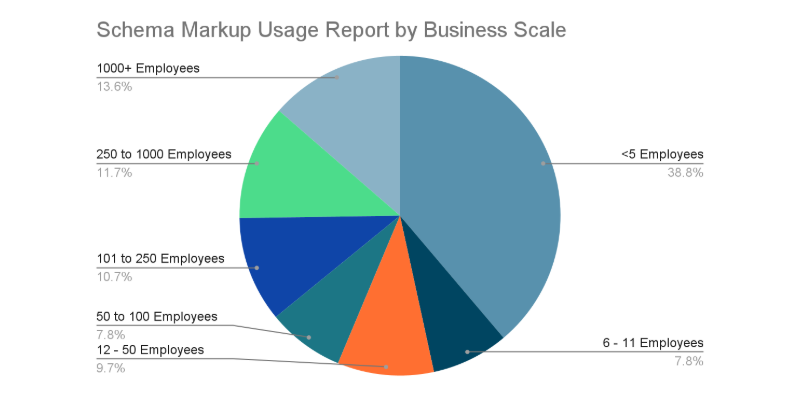SEO Beyond Keywords: Why Schema Markups Need Your Attention?

Does your business get lost on Google’s search engine results page even after spending considerable time and resources on SEO?
If so, it’s time to advance your SEO practices with Schema Markup!
Schema markup provides marketers with an excellent opportunity to enhance SERP visibility by surfacing relevant data that users need to make informed decisions.
It allows content to qualify for enhanced search engines, such as Google, displaying additional information like star ratings, prices, and stock availability.
There are several variations of schema markup, and utilizing the right one for essential pages of your website can increase clicks and conversions.
Still confused about schema markup for SEO?
Relax, we’re here to break it down for you; simple, clear, and flawless.
Let’s get started.
Definition of Schema Markup
Technically, schema markup is a set of structured data that you could set into your web page code to tell search engines more about the content, context, and value of the page you’re developing.
For instance, Apple’s product pages for iPhones, Macs, and other gadgets use schema tags, and Google displays information such as product availability, price range, and more in the search results.
This additional layer of information helps search engines comprehend the specifics of your content and its relevance to search queries. Therefore, schema can improve how your web pages are indexed in search results and increase their chances of attracting the right audience.
Schema Markup Stats
At Qtonix, our experts found that approximately 40% of responders are using schema for small companies with less than five employees, followed by large enterprises at 13.6%. From SMB to enterprise, schema markup has become a standard practice across the board.
This massive adoption reflects a growing recognition of how structured data can contribute to online visibility, traffic, and enhanced search results, as well as richer search features. Modern businesses are utilizing Schema to gain a competitive edge in digital marketing.

Significance of Schema in SEO
Adding schema markup for SEO provides value to both search engines and users. Here are some notable benefits:
1. Helps Search Engines Know Your Content
We all know that humans are capable of inferring the meaning of content. Google, on the other hand, uses machine learning to understand online content. That’s why search engines require additional support to infer the meaning and intent of your site’s content. You can help them by providing semantic schema markup in your web pages.
Shema’s standard vocabulary enables search engines to understand the Structured Data on your page easily. It helps their algorithms serve users with content that matches their expectations.
2 Enhances Search Engine Rankings
As previously discussed, allowing Google to understand the content on your web pages elevates the chances of better search engine rankings. When a search engine like Google recognizes what your content is, it is more likely to display it as a relevant result for specific searches. As a result, it improves visibility in search engine result pages.
Our experience suggests that clients who have implemented schemas on their websites have seen practical improvements in their rankings. On average, we’ve found that their sites ranked two or three on Google.
3. Thoroughly Improves SERP Visibility
The information schema markups help search engines enhance your search listings and represent them as rich snippets. Popular schema types, such as Breadcrumbs, Ratings, Reviews, and FAQs, allow visitors to notice a listing even if it appears lower down on a page and also provide social proof that helps persuade the searcher to select a particular search result over another.
4. Helps Increase ROI
Schema tags make your search results more informative and appealing, effectively boosting your ROI. It helps you attract customers who want to make a purchase decision. For instance, integrating a structured markup, such as star ratings, shows the overall quality of a specific product and builds customer trust at the same time. This level of enhancement significantly increases click-through rates and encourages customers to explore your product offerings more thoroughly.
5. Drive Better Business Outcomes
Schema markup acts as an SEO strategy that helps businesses drive measurable results. By using tools like Schema Performance Analytics and Google Search Console, you can finely track how your marked-up pages are working.
As more businesses adopt this strategy, leveraging it can give you a valuable competitive advantage. It helps your overall content stand out in search results while providing users with an informative and trustworthy experience.
Best-Fit Schemas for Content Types
Did you know? There are approximately. 800 schema types and 1453 schema properties available. Therefore, selecting the proper Schema based on your content might be difficult for you. For your convenience, we have shared a quick list of popular content types and corresponding schema recommendations below:
| Sl No. | Type of Content | Recommended Schemas |
| 1 | Blogs and Articles | NewsArticle, BlogPosting, etc. |
| 2 | Local Business Pages | LocalBusiness, Organization, etc. |
| 3 | Product Pages | AggregateRating, Product, Offer, Review, etc. |
| 4 | FAQs | FAQPage |
| 5 | Event Pages | Event |
| 6 | Tutorials | HowTo |
| 7 | Job Listings | JobPosting |
| 8 | Recipe Pages | Recipe |
| 9 | Video Content | VideoObject |
| 10 | Review Pages | Review, AggregateRating, etc. |
| 11 | Medical Blogs | MedicalWebPage, MedicalCondition, etc. |
Importance of Schema for Local SEO
Local SEO schema helps businesses that solely rely on regional customers. It allows Google to display essential business information, such as operating hours, precise location, and reviews. This is essential for Google’s Local Pack, which suggests businesses near the customer’s location.
For instance, a local shop can implement structured data to highlight a “Place an Order” button, showcase customer reviews, and promote seasonal offers. On the other hand, an event management company may showcase their upcoming events with times, dates, and “Book Your Ticket” buttons. This makes it convenient for potential customers to quickly engage with search queries.
Here is an example of local business schema implementation:
{
“@context”: “https://schema.org”,
“@type”: “LocalBusiness”,
“name”: “Bakery Shop”,
“image”: “https://www.bakeryshop.com/logo.jpg”,
“address”: {
“@type”: “PostalAddress”,
“streetAddress”: “123 Main Street”,
“addressLocality”: “Bhubaneswar”,
“addressRegion”: “OD”,
“postalCode”: “751001”,
“addressCountry”: “IN”
},
“telephone”: “+91-9876543210”,
“openingHours”: “Mo-Sa 08:00-22:00”,
“url”: “https://www.bakeryshop.com”,
“priceRange”: “₹₹”,
“servesCuisine”: “Bakery, Dessert”,
“geo”: {
“@type”: “GeoCoordinates”,
“latitude”: “18.5204”,
“longitude”: “73.8567”
}
}
Importance of Schema for E-commerce SEO
Schema markup can improve e-commerce SEO by making product and shopping pages more engaging, informative, and visible in search results. Key benefits of schema tags for e-commerce websites include:
1. Increases Product Visibility:
Product schema allows search engines to understand the inventory quickly. Therefore, you can precisely index and showcase your products for relevant search queries. This results in improved visibility on platforms like Google Shopping and Search.
2. Supports AI Voice Search Assistant:
With the advancement of AI assistants and voice search, Schema ensures your product data is understood easily by offering structured and machine-readable information.
3. Minimizes Bounce Rate:
Users who engage with search results featuring product reviews, enabled by Schema, are often closer to purchase. As a result, they’re more likely to stay on your website and convert. This results in lower bounce rates.
4. Better Eligibility for Google Features:
Schema markups can enable eligibility for different Google features, like:
- Popular products section
- Product carousels
- Image previews
- “In stock” tags
Start Implementing Your Schema Markup Today
The significance of schema markup for SEO is undeniable.
If you’re a business owner, marketer, or blogger, incorporating schema markup is a smart move that can help you rank higher in search results.
Schema unlocks a technical and powerful path to higher CTR, qualified traffic, and better rankings. Any online business can effectively generate measurable results using this structured data.
You need to build, manage, and optimize the Schema carefully to stand out. Otherwise, you may encounter issues such as schema drift, which can prevent your content from achieving optimal results.
Ready to personalize your website with schema? Let us manage the technical details while you focus on growing your business. Contact our experts for more information.
FAQs
You need to add a schema using JSON-LD, HTML microdata, and other plugins if you’re using WordPress. Tools like Google’s Rich Results Test can help validate your schema implementation.
The right type of schema tag highly depends on your content. Popular SEO-boosting schemas include LocalBusiness, Product, Article, FAQPage, Review, Recipe, Event, and HowTo.
Though it’s not mandatory, any website can benefit from a schema mark. Particularly, e-commerce stores, blog sites, local online businesses, and service providers can improve their visibility with Schema.
Once implemented carefully, schema-rich results may begin to appear within a few days. However, the actual result highly depends on Google.
No, metadata and schema markups are not the same. Schema delivers more structured and deeper information that search engines use to improve listings.
Written by Adam Gibbs
Adam is a skilled SEO content expert with a proven track record of crafting high-quality, keyword-rich content that drives traffic, engages readers, and ranks on search engines. With 10+ years of experience in digital marketing and content strategy, Adam specializes in creating blog posts, website copy, and marketing materials tailored to both audience needs and SEO best practices.
Related Posts
- All Posts
- SEO
Table of Contents Book Intro Call Case Studies Share: Related Guides: Related Posts How to Verify Your Domain in Meta...
Table of Contents Book Intro Call Case Studies Share: Related Guides: Related Posts How to Verify Your Domain in Meta...

Table of Contents Book Intro Call Case Studies Share: Related Guides: Related Posts How to Verify Your Domain in Meta...
Table of Contents Book Intro Call Case Studies Share: Related Guides: Related Posts How to Verify Your Domain in Meta...


